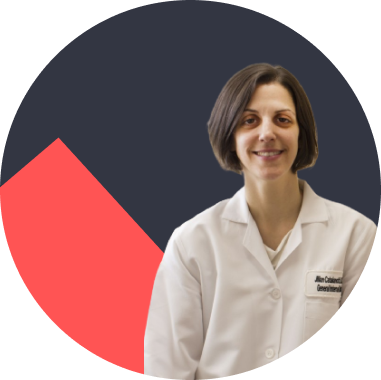Loving Your Patients with
Dr. Jillian Catalanotti

A Conversation with Dr. Jillian Catalanotti
“I think there is such a role for regular reflection to say: What is important to me? What did I do well, and what do I still need to work on to get to those things that are important to me? What are the barriers that are getting in the way of that? And what could I have done better today?”
Bio
Dr. Jillian Catalanotti is the Program Director of the Internal Medicine Residency Program and Associate Professor of Medicine and of Health Policy & Management at The George Washington University (GW). She is responsible for 110 residents in two programs and 55 fellows in 12 fellowship programs. Dr. Catalanotti has co-designed and co-directs the Underserved Medicine and Public Health concentration, a two-year longitudinal program for residents with a special interest in working with underserved populations. She was recently awarded the Walter J. McDonald Award for Early Career Physicians from the American College of Physicians. She is on many national committees and has a number of publications on improving medical education.
What are some early events in your life that helped shape your journey?
“So, I’m from Long Island, New York, ”Dr. Catalanotti says, “I have a very close family. I have two sisters and my parents, and we were fortunate to live about fifteen minutes away from my grandparents. We were the kind of family where everybody knows everybody’s business and everyone’s giving everyone advice, both welcome and unwelcome at all times! But we were not a medical family.”
In fact, Dr. Catalanotti described her family as somewhat anti-medical. “I distinctly recall the day that I got into medical school, and I called my grandmother to let her know the great news that I had been accepted to medical school. And she said, ‘Jill, I’m so proud of you. And you should know that I hate all doctors.’” The word hate stood out to Dr. Catalanotti because it was a word she had never heard her grandmother use before.
Despite the opposition she received, Dr. Catalanotti, or Jill at the time, plunged forward. She recalled thinking to herself when she was in school, “I want to teach people about their health and I want to help them to figure out how they can maintain their own health.” That passion drove her to medical school where she had an amazing experience.
What life lessons did you learn early on that have stayed with you?
Dr Catalanotti recalls a lesson she learned early on from her mom, who was a retired New York City middle school teacher, “One thing that I definitely learned from her was that it was just as important to love your students as it is to love your subject.”
Dr. Catalanotti places a high emphasis on loving her patients. For her, this is just as important as the medical advice she shares. Admittedly, this is not always easy. Sometimes patients have unique challenges and have a way of taking those frustrations out on those around them. It’s then that Dr. Catalanotti steps back and says, “This is someone’s mother, this is someone’s sister, this is someone’s daughter. And how would I want my mother or my sister to be treated in this interaction”
This mindset helps her reset and keeps her from becoming frustrated. She always asks herself this question: “How will I tailor the advice that I’m giving [my patients] that will meet them where they’re at, and prioritize what’s important to them to prioritize?”
How Do You Stay Grounded in the Values that Compelled You to Become a Doctor?
“I think the best tool for doing that is just talking to our patients and learning their stories,” Dr. Catalanotti notes. She goes on to make the point that it is pretty hard to speak to a hospitalized patient without realizing this is not where they would want to be at this moment in their life. No one wants to be in the hospital.
But where other physicians might acknowledge this bleak reality and move on, Dr. Catalanotti sees this as a tremendous opportunity to encourage and build lasting friendships. In a move that is not common among others in her profession, Dr. Catalanotti takes a personal interest in her patients by making note of their birthdays, anniversaries, or special holidays they celebrate. Then, on those days, she makes the extra effort to stop by her patient’s rooms and offer words of encouragement.
As Dr. Catalanotti correctly remarks, “Although maybe we’re not the people they want to be celebrating those things with, if we’re the ones they’re stuck with, we should celebrate those things with them.”
Who Was an Important Mentor in Your Life?
Dr. Carol Bates, the Primary Care Program Director at Beth Israel Deaconess Medical Center, is at the top of Dr. Catalanotti’s list.
She recalls the first time she heard Dr. Bates in person at a teaching conference and being so impressed with how eloquently she spoke. As she left, she made a mental note to do what she could to meet Dr. Bates in person. Over time, they developed a great friendship and Dr. Bates mentored her through some big life decisions she had to make when her husband’s work moved them to Washington D.C.
If there was one piece of advice Dr. Catalanotti would give to young physicians, it would be to not be intimidated by mentors who may sometimes seem to be larger than life. Take the effort to reach out.
What Are the Most Effective Traits of Successful Residents?
Proactive learning tops Dr. Catalanotti’s list of most effective traits. In her words, the most successful residents are the ones who say, “Hey, it’s actually my job to generate the questions now, there’s not someone else who’s going to tell me which book to read or give me a test of what those questions are.”
She takes an older school approach to learning and challenges her students to pull out a blank paper and pen after they are finished reading something and write out a fake assessment and plan based on the topic. This creates for a more active learning process and notes prepared in this format will actually be useful in the future. Over the years, Dr. Catalanotti has been surprised how many times she has returned to assessments and plans.
Reflection is another important trait. She closes with this thought: “I think there’s such a role for regular reflection to say: What is important to me? What did I do well, and what do I still need to work on to get to those things that are important to me? What are the barriers that are getting in the way of that? And what could I have done better today?”
Pearls of Wisdom
- Love your patients as much as you love medicine.
- Get to know your patients, not only by name but as individuals. Learn who they are, what they like and what they value.
- Do not be intimidated when reaching out to mentors who are farther along their career path. They are going to be much more helpful than you might think.
- Be proactive in learning whether in the wards when interacting with patients or at home when studying a topic.
